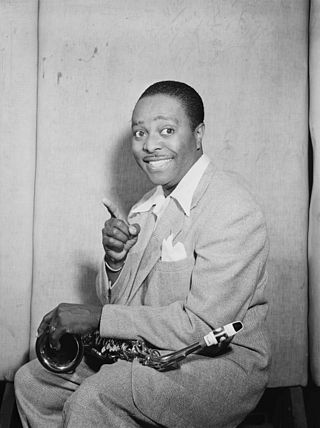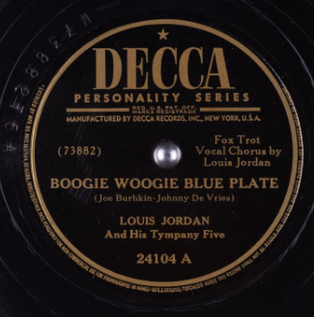
Louis Thomas Jordan was an American saxophonist, multi-instrumentalist, songwriter and bandleader who was popular from the late 1930s to the early 1950s. Known as "the King of the Jukebox", he earned his highest profile towards the end of the swing era. He was inducted into the Rock and Roll Hall of Fame as an "early influence" in 1987.
Jump blues is an up-tempo style of blues, jazz, and boogie woogie usually played by small groups and featuring horn instruments. It was popular in the 1940s and was a precursor of rhythm and blues and rock and roll. Appreciation of jump blues was renewed in the 1990s as part of the swing revival.
"Choo Choo Ch'Boogie" is a popular song written by Vaughn Horton, Denver Darling, and Milt Gabler.
The Hot R&B/Hip-Hop Songs chart ranks the most popular R&B and hip hop songs in the United States and is published weekly by Billboard. Rankings are based on a measure of radio airplay, sales data, and streaming activity. The chart had 100 positions but was shortened to 50 positions in October 2012.
"Let the Good Times Roll" is a jump blues song recorded in 1946 by Louis Jordan and his Tympany Five. A mid-tempo twelve-bar blues, the song became a blues standard and one of Jordan's best-known songs.

"Don't Worry 'Bout That Mule" is a song attributed to Charles Stewart, William Davis, Duke Groaner, and Fleecie Moore. It was performed by Louis Jordan and his Tympany Five, recorded in July 1945, and released on the Decca label.
"Ain't That Just Like a Woman (They'll Do It Every Time)" is a 1946 song written by Claude Demetrius and Fleecie Moore and recorded by Louis Jordan and Tympany Five. The song reached number one on the R&B Jukebox chart for two weeks and peaked at number seventeen on the pop chart. Chuck Berry, who acknowledged the influence of both Louis Jordan and Carl Hogan, copied the latter's guitar intro to the song for his 1958 classic "Johnny B. Goode".

"Texas and Pacific" is a song written by Jack Wolf Fine and Joseph E. Hirsch. It was performed by Louis Jordan and his Tympany Five, recorded in October 1946, and released on the Decca label. The song describes a rider's experience on the Texas & Pacific Railway. The "B" side of the record was "I Like 'Em Fat Like That".

"Jack, You're Dead" is a song written by Dick Miles and Walter Bishop. It was performed by Louis Jordan and his Tympany Five, recorded in October 1946, and released on the Decca label. The song describes a man's physical state if he fails to respond to romance.

"Boogie Woogie Blue Plate" is a song written by Joe Burhkin and Johnny DeVries. It was performed by Louis Jordan and his Tympany Five and released on the Decca label.

"Early in the Mornin'" or "'Early in the Morning" is a song that was recorded by Louis Jordan and His Tympany Five in 1947. It is an early example of a blues which incorporates Afro-Cuban rhythms and percussive instruments. "Early in the Mornin'" became a hit, reaching number three in Billboard magazine's race records chart.
Carl D. Hogan was an American jazz and rhythm and blues guitarist and bassist. He is known for playing the lead guitar riff on Louis Jordan's "Ain't That Just Like a Woman " which was later imitated by Chuck Berry for his hit "Johnny B. Goode".

"What's the Use of Getting Sober (When You Gonna Get Drunk Again)" is a song written by Busby Meyers, performed by Louis Jordan and his Tympany Five, recorded in July 1942, and released on the Decca label (catalog no. 8645). The "B" side of the record was "The Chicks I Pick Are Slender and Tender and Tall".
Billboard Most-Played Race Records of 1947 is a year-end chart compiled by Billboard magazine ranking the year's top race records based on the number of times the record was played on the nation's juke boxes.Billboard assigned point totals to each record based on its juke box plays.
Billboard Most-Played Race Records of 1946 is a year-end chart compiled by Billboard magazine ranking the year's top race records based on the number of times the record was played on the nation's juke boxes.Billboard assigned point totals to each record based on its juke box plays.

"Salt Pork, West Virginia" is a song attributed to Fleecie Moore and William J. Tennyson Jr., performed by Louis Jordan and his Tympany Five, and released on the Decca label. It peaked at No. 2 on Billboard's race record chart and remained on the chart for 15 weeks. It ranked No. 8 on the magazine's list of the most played race records of 1946.

"Beware" is a song attributed to Morry Lasco, Dick Adams, and Fleecie Moore. It was performed by Louis Jordan and his Tympany Five, recorded in January 1946, and released on the Decca label.

"Reconversion Blues" is a song attributed to Steve Graham and Fleecie Moore. It was performed by Louis Jordan and his Tympany Five, recorded in October 1946, and released on the Decca label. The record's "B" side was "Salt Pork, West Virginia".

George Vaughn Horton was an American songwriter and performer. Usually credited as "Vaughn Horton" or "George Vaughn", he wrote or contributed to the success of a number of popular songs, including "Choo Choo Ch'Boogie", "Hillbilly Fever", "Sugar-Foot Rag", "Mockin' Bird Hill" and the Christmas song "Jolly Old Saint Nicholas".











